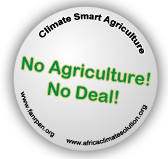 ACCID RSS newsfeed ACCID RSS newsfeed
Time for recognition: Building on the progress at CSW57 to empower women in agriculture
27 March 2013, Huffington Post
URL: http://www.huffingtonpost.com/anette-engelund-friis/time-for-recognition_b_2926266.html
By Annette Engelund Friis, Manager, Climate Change Policy, Danish Agriculture & Food Council
From March 4-15, the UN Commission on the Status of Women was held in New York, this is the 57th annual meeting where influential spokespeople from around the world discuss the issue of female empowerment. The main theme this year was the prevention and elimination of all forms of violence against women and girls. In the opening address Chair of the Commission, Marjon Kamara, urged members to "translate actions and strategies into measures that tangibly benefit women and girls." After ten years of discussion on the topic of violence Kamara's encouragement for tangible outcomes was finally achieved, as 130 states agreed to adopt the conclusions of the commission. The agreed conclusions include a declaration that states will recognize the links between violence against women and girls with wider issues such as education, poverty eradication and food security.
Food security is the biggest challenge we face in the future with the population predicted to reach nine billion by 2050. As I underlined in my blog posted on International Women's Day the link between violence and food security is an area only just beginning to gain momentum in development discussions. The CWS57 is an important step in conceptualizing issues and goals relating to gender and women's empowerment in the post-2015 development agenda.
The Millenium Development Goals have so far had limited success for women. Despite a 75 percent increase in women in parliament around the world from 1995-2012, many parts of the developing world, such as Sub-Saharan Africa, have seen little if any significant change. This is a concern for women, as more than 60 percent of employed women in Sub-Saharan Africa work in agriculture yet are not represented at policy level. Women continue to suffer due to the lack of representation.
For instance, poor infrastructure means that rural women must spend tremendous amounts of time providing fuel and water for households, meaning that in some African countries women spend around 40 billion hours a year collecting water. Women are also subject to poor land rights and evidence indicates that if women had the same access to resources as men, they could increase yields by up to 30 percent.
As world leaders look beyond the MDGs to define the role women will play in the Sustainable Development Goals it is extremely important that women are recognized at the heart of achieving food security. In a report from the FAO, IFAD and WFP entitled Rural Women and the Millennium Development Goals it is suggested that women are key for sustainable agriculture. Research suggests that women express more concern for the environment and also form the "backbone of agricultural labor", proving that women will play a central role in mitigating the effects of climate change in agriculture.
This recognition is beginning to surface at all levels, the UN Secretary General's High-Level Panel on global sustainability noted that "any serious shift towards sustainable development requires gender equality". The World Economic Forum supports this, reporting that across 135 countries, greater gender equality correlates positively with per capita gross national product.
As Farming First's infographic the Female Face of Farming demonstrates, women on average comprise 43 percent of the agricultural labor forces in developing countries and their share of the labor has increased around the world over the last thirty years. Despite their massive contribution to food security, the yield gap between men and women is still 20-30 percent mostly due to the lack of resources available to female farmers who are often subject to lower wages and minimal (if any) training, and who are crucially left out of high-level policy-making. An inclusion for female farmers in the Sustainable Development Goals is vital if they are to grow enough food to feed the population post-2015.
This lack of recognition for women in society is far more detrimental than many people may realize, as the UNFPA state "women's empowerment is vital to sustainable development and the realization of human rights for all." Farming First recognizes the crucial role of women in global development, particularly food security, and will continue to advocate the female face of farming on the road to shaping the sustainable development agenda.
The acceptance of the agreed conclusions of the commission by all the member states has proven that gender equality is attainable. The UN will hopefully reinforce the central role of women next year in the 58th Commission, which will focus on the challenges, and achievements in implementing the Millennium Development Goals for women. The session is likely to analyze how the MDGs have affected women around the world and must help shape the role women will play in the Post-2015 Sustainable Development Agenda.
|

